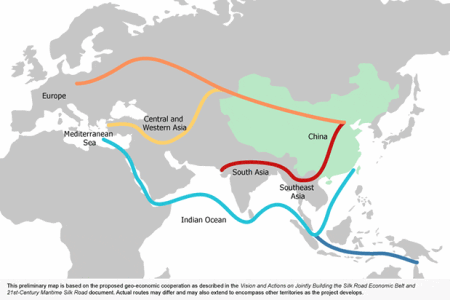China’s “Belt and Road” development strategy must become a world initiative in order to truly succeed, says Vincent Lo, chairman of Shui On Land. Speaking at the recent ULI Asia Pacific Summit in Shanghai, Lo, who is also chairman of the Hong Kong Trade Development Council, explained how the Belt and Road plan is intended to work and the scale of the opportunity it presents.
The Belt and Road Initiative, named for the Silk Road Economic Belt and the 21st Century Maritime Silk Road, is a development strategy launched by the Chinese government to promote economic cooperation among countries along several proposed trade routes.
For Beijing, the initiative could open new markets, widening the trading and commercial horizons to export Chinese surplus products, which would improve the innovation and competitiveness of Chinese industries. It also could help the nation develop a more active foreign policy, which would promote Chinese interests.
The initiative’s name echoes the historic Silk Road that connected China, then the only source of silk, with Europe.
The proposed overland Silk Road Economic Belt focuses on linking China with Europe through central Asia and Russia; with the Middle East through central Asia; and with Southeast Asia, South Asia, and the Indian Ocean.
On the other hand, the 21st Century Maritime Silk Road focuses on using Chinese coastal ports to link China with Europe through the South China Sea and Indian Ocean, and with the southern Pacific Ocean through the South China Sea.
However, “It’s not China going out to take advantage of everybody,” Lo said. “This has to be a world project.”
The various routes pass through 65 countries with a total population of 4.4 billion, encompassing 63 percent of the world’s people but only 30 percent of the world gross domestic product, said Lo. “So there’s a lot of upside there,” he added.
Despite the ambitious nature of the program, proposed by Chinese President Xi Jinping and estimated to cost $8 trillion, it “will materialize in a very rapid manner,” said Lo.
He stressed the importance of infrastructure investments along the routes. “Look at how Chinese cities have developed over the past 30 years and apply that to the Belt and Road emerging cities,” he said. “They are behind now, but with investment in infrastructure, everything else will follow.”
The initiative has been accompanied by the creation of the Asian Infrastructure Investment Bank (AIIB). The AIIB will focus on development of infrastructure and other productive sectors in Asia, including energy and power, transportation and telecommunications, rural infrastructure and agriculture development, water supply and sanitation, environmental protection, urban development, and logistics.
Fifty-seven nations have joined the AIIB, and Lo said membership would reach 100 by the end of this year. As well as Asian and Middle Eastern nations, European countries such as the United Kingdom, Germany, and France have joined.
Lo outlined Hong Kong’s ambition to be the center of financing for the Belt and Road Initiative. One element of this is to encourage standardization—of loan forms, for example—which would increase the efficiency of doing business across the diverse nations under the Belt and Road scheme.
“We recognize that we can’t get all these countries working together right away,” he said. “However, competing countries will be encouraged to accept standardization.”
Lo said he appreciates that not every developing nation along the Belt and Road will have suitable projects for investment, but that once the first projects are underway, the progress will encourage other nations to participate.





